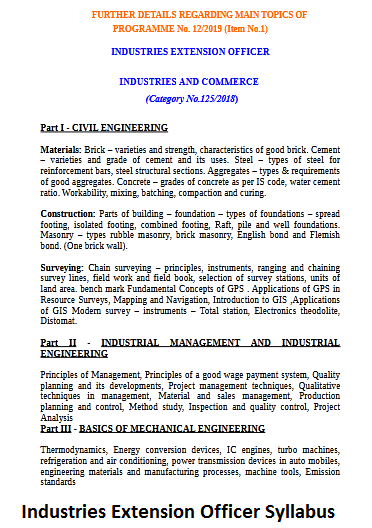Industries Extension Officer Syllabus 2024 :The Industries Extension Officer syllabus, covering various disciplines like Civil Engineering, Electrical Engineering, Mechanical Engineering, Computer Science Engineering, Electronics Engineering, and Industrial Management & Industrial Engineering, is crucial for candidates aiming to excel in the KPSC Industries Extension Officer examination. Studying this Industries Extension Officer Syllabus helps tailor preparation strategies and ensures success in securing the position.
Read –GSSSB CCE Clerk Syllabus
Industries Extension Officer Syllabus – Summary
| Organization Name | |
| Post Name | Industries Extension Officer (IEO) |
| Category | Syllabus |
| Apply Mode | Online |
| Selection Process | Written Exam (OMR), Document Verification |
| Location | Kerala |
| Exam Mode | Offline |
| Official Website | www.keralapsc.gov.in |
Industries Extension Officer Exam Pattern

- Total number of questions: 100
- Total Marks: 100 Duration: 1 hour 15minutes
- Each question carries 1 mark. There is no negative marking.
- Exam Type: MCQ
| Part | Subject | Marks |
| PART I | CIVIL ENGINEERING | 20 |
| PART II | INDUSTRIAL MANAGEMENT AND INDUSTRIAL ENGINEERING | 12 |
| PART III | BASICS OF MECHANICAL ENGINEERING | 8 |
| PART IV | ELECTRICAL ENGINEERING | 20 |
| PART V | ELECTRONICS ENGINEERING | 20 |
| PART VI | COMPUTER SCIENCE ENGINEERING | 20 |
| Total | 100 |
Civil Engineering
- Brick – Varieties and strength
- Cement – Varieties and grade of cement and its uses
- Steel – Types of steel for reinforcement bars, steel structural sections
- Aggregates – Types and requirements of good aggregates
- Concrete – Grades of concrete as per IS code, water-cement ratio
- Surveying: Chain surveying – principles, instruments, ranging and chaining survey lines, fieldwork and field book, selection of survey stations, units of land area, benchmark, Fundamental Concepts of GPS. Applications of GPS in Resource Surveys, Mapping and Navigation, Introduction to GIS, Applications of GIS Modern survey – instruments – Total station, Electronics theodolite, Distomat.
- Construction: Parts of building – foundation – types of foundations – spread footing, isolated footing, combined footing, Raft, pile and well foundations. Masonry – types rubble masonry, brick masonry,
Industrial Management and Industrial Engineering
- Principles of management
- Principles of a sound wage payment system
- Project management techniques
- Quality planning and developments
- Qualitative techniques in management
- Material and sales management
- Production planning and control
- Method study
- Inspection and quality control
- Project analysis
Basics of Mechanical Engineering
- Energy conversion devices
- IC engines
- Thermodynamics
- Refrigeration and air conditioning
- Power transmission devices in automobiles
- Engineering materials and manufacturing processes
- Machine tools
- Emission standards
Electrical Engineering
- Electric circuits – Kirchhoff’s laws, Magnetic Circuits: MMF, field strength, flux density, reluctance comparison between electric and magnetic circuits.
- Electrical machines: Construction and working principle of single-phase and three-phase transformers, DC generator and motors, and AC generators and motors
- Electromagnetic induction: Faraday’s laws, Lenz’s laws: Statically induced and dynamically induced EMFs-self-inductance and mutual inductance, coefficient of coupling
- Generation of power: Conventional and non-conventional
- Three-phase systems: Generation of three-phase voltages, advantages of three-phase systems, star and delta connection (balanced only), the relation between line and phase voltages, line, and phase currents.
Electronics Engineering
- Inductors
- Resistors
- Diodes – PN junction diode, Zener diode, photodiode, solar cell
- Capacitors – Types, working principles and uses
- Working principle of analogue and digital multimeter, function generator, UPS, GPS, GSM, and GPRS, Bluetooth, and WIFI.
Computer Science Engineering
- Introduction to digital computer- A simple model of a computer with the acquisition of data, storage of data, processing of data, the output of processed data. Details of functional units of a computer, primary storage, and secondary storage.
- Problem-solving strategies – Problem analysis – a formal definition of problem – solution – breaking a problem into subproblems-overview of the solution to the subproblems by writing step by step procedure (algorithm)-representation of the procedure by a flowchart
- Introduction to programming languages: Types of programming languages-high level language, assembly language and machine language, system software-operating systems-objectives of operating systems, compiler, assembler and interpreter (concepts only)
Free Model Paper
- Civil Engineering
- Mechanical Engineering
- Electronics Engineering
- Electrical Engineering
- Computer Engineering
How To Download KPSC Industries Extension Officer Syllabus ?
- Go to the Kerala Public Service Commission website.
- Go to “Recruitment” or “Examinations”.
- Find “Industries Extension Officer Syllabus.”
- Click the link to proceed.
- The syllabus will be PDF.
- Save the syllabus by clicking download.
- You may also right-click and “Save link as” to download the syllabus.
Important Links
| Industries Extension Officer Syllabus | Click Here |
| Official Website | Click Here |
| Our Home Page | Click Here |
| Kerala PSC Recruitment 2024 | Click Here |
| KPSC recruitment assistant vacancy in Kerala 2024 Click Her | Click Here |
| KPSC Group A B Syllabus 2024 | Click Here |
| Kerala PSC Civil Excise Officer Syllabus 2024 | Click Here |
FAQs
1) Is there a PDF Industries Extension Officer Syllabus?
The syllabus is usually available in PDF format on the KPSC website.
2) Is the Industries Extension Officer Syllabus available offline?
Your smartphone can access the syllabus offline after downloading it.
3) How can I prepare thoroughly with the Industries Extension Officer Syllabus?
Studying each syllabus topic and practice related questions might prepare you for the exam.
